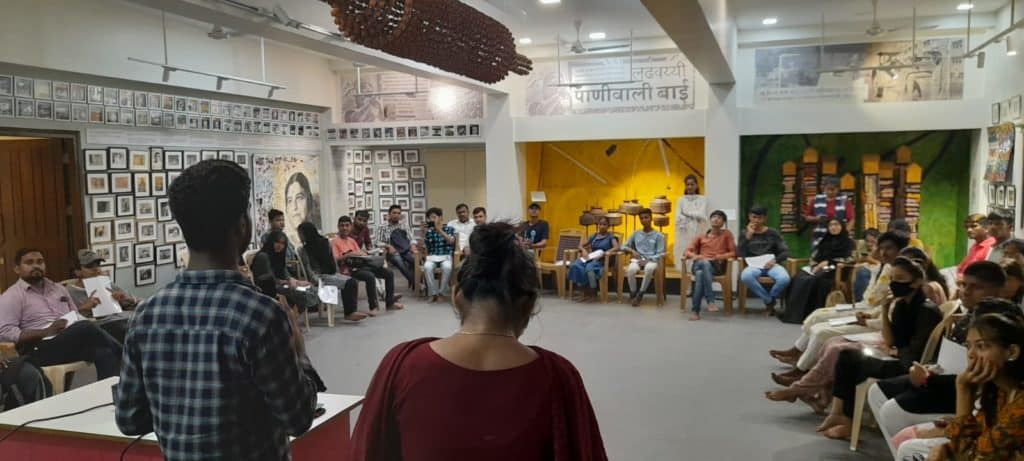On July 12th, Citizen Matters hosted a panel discussion on the National Youth Policy in collaboration with Youth for Unity and Voluntary Action (YUVA), a non-profit developmental organisation that enables vulnerable groups to access their rights.
Moderated by Sabah Virani, Reporter at Citizen Matters Mumbai, the panel consisted of YUVA Project Lead, Youth Work, Sachin Nachnekar and youth activists from YUVA in Mumbai named Pranaya Patade, Shehenshah Ansari, Sana Shaikh, Asma Ansari, and Swapnil Shinde.
All of them had earlier participated in consultations that YUVA organised to understand the youth’s perspective on the new draft National Youth Policy (NYP), an initiative that seeks to define the vision of the Government of India for the youth of the country and identify the key areas in which action is required. The government had invited suggestions that can be incorporated in the final policy, which envisions a decade of youth development.
The event invited discussion on the National Youth Policy, whose focus areas are education, employment, entrepreneurship, youth leadership and development, health, fitness, sports and social justice.
Is the ground reality different from what the policy addresses?

Sachin Nachnekar, provided analysis of the draft policy and its importance. He shared experiences of conducting consultations across the state with above-mentioned team members and emphasised the need for greater awareness of the policy. According to Shehenshah Ansari, understanding the NYP is the most challenging part for the average youth. “It’s a complicated piece of text. It is difficult to decipher the gaps in policy if nobody understands it in the first place” he said. The policy was introduced in the middle of the pandemic when no one was going to school or college, and didn’t have time or the resources to understand the policy.
Speakers highlighted the issue of lack of awareness among youth and shared their experiences from the consultations YUVA had organised. Many of these consultations, held in rural and urban areas of Maharashtra, required the activists to inform the local youngsters about the policy and what it entails and then invite suggestions from them.
“The youth aren’t being made aware of schemes and platforms like Unnati, Nehru Yuva Kendra and National Service scheme that fall under the youth policy and can aid youth’s development,” Shehenshah added. Swapnil and Pranaya went on to add that a lot of these schemes exist to help the youth, but there is no medium to educate them about it. “Colleges don’t help with this,” said Pranaya. She also spoke about not having an accessible point of contact for issues related to the policy other than Youth Affairs and Sports Ministry.
Read more: Tracking civic grievances in Mumbai is tough as people take to social media to complain
What is missing in the policy?
Various speakers raised the issue of how the policy’s primary principle- social inclusion is not absolute. According to them, it talks about youth development, but does not factor in the needs of all youth. According to Sana, there is no mention of the LGBTQ+ community, and how they can benefit from the policy. She also said that the policy does not address challenges related to gender bias, reproductive health and mental health of its youth.
Others spoke about how the policy is drafted mainly for high school students. “What about after high school? What about those who drop out of schools? What are the provisions for students outside educational institutions?” said Sana. The panellists said the draft NYP is myopic in view and does not cater to youth in different circumstances such as jobs, marriages and so on.
Pranaya thinks that there is a huge focus on skill building and vocational development, and not that much of a focus on education, especially higher education. She said access to education was crucial for inculcating good thoughts and ideas among the youth. To this Shehenshah added that there are no platforms for youth to practise political expression, and that it can be a barrier in creating informed citizens of the future.
Sana and Asma spoke about every educational institution’s responsibility to create a safe space for the students to express themselves and their emotions. “The policy should address the reasons for the increasing suicide rate among the youth and improve the environment in schools. Schools don’t realise that they are accountable to their students. Running a school is a huge responsibility, and the youth’s future depends on it,” said Asma.
What is the biggest area of worry in the draft NYP? What is most needed today?
A worry that echoed with most of the panellists was about higher education being inaccessible to most. “We’d like to have proper career guidance in schools and colleges,” said Sana. It is common for students from underprivileged backgrounds to be stuck in a cycle of poverty. A lot of children have to drop out of school, as they need to support the family by working. The youth suggested that colleges and schools can focus on a career-oriented approach that inculcates students’ likes and dislikes and guides them towards their related fields.
“Fees for postgraduate courses are simply too expensive for most, making it inaccessible for a lot of students. There should be financial assistance schemes for such students along with building capacity in night schools for postgraduate programs, for those who have to work day jobs.” Sana added.
The draft NYP has multiple gaps in policy and implementation, but students can provide feedback to make the policy work in their favour. The National Youth Policy aims to address most aspects of youth development like education, entrepreneurship, health etc – but does not address anything in much detail, said the youth. The conversation concluded with panellists highlighting the need for more awareness about the NYP in schools and improved provisions for higher education, especially for those coming from underprivileged backgrounds.
You can watch the discussion here: